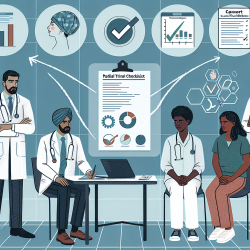The Future of Alzheimer's Research: A Call to Action for Practitioners
As the global population ages, late-onset Alzheimer's disease (LOAD) presents a growing challenge for healthcare systems worldwide. The research paper "Before it is too late: professional responsibilities in late-onset Alzheimer’s research and pre-symptomatic prediction" provides a comprehensive overview of the ethical, social, and scientific considerations involved in the early detection and treatment of Alzheimer's disease. This blog post will explore the implications of these findings for practitioners and suggest ways to integrate these insights into practice.
The Role of Biomarkers in Alzheimer's Research
Biomarkers have revolutionized the approach to Alzheimer's research by enabling the detection of pre-symptomatic stages of the disease. These biomarkers include genetic tests, neuroimaging, and cerebrospinal fluid analysis. They offer the potential to identify individuals at risk of developing Alzheimer's before symptoms appear, allowing for earlier intervention and potentially more effective treatment.
However, the application of biomarkers in clinical practice raises several ethical and social challenges. Practitioners must balance the benefits of early detection with the risks of overdiagnosis and the psychological impact of knowing one's risk status. It is crucial to develop ethical frameworks that guide the use of biomarkers in a way that respects patient autonomy and minimizes harm.
Ethical Considerations and Professional Responsibilities
The research paper highlights the need for a systematic ethical reflection on the use of biomarkers in Alzheimer's research. Practitioners must navigate complex ethical dilemmas, such as the disclosure of risk information and the potential for stigmatization. To address these challenges, the paper recommends the development of ethical guidelines that prioritize informed consent, data protection, and the minimization of psychological distress.
Practitioners should also be aware of the cultural and social diversity in patients' attitudes towards risk information. Engaging in open dialogues with patients and their families can help tailor communication strategies to individual needs and cultural contexts.
Recommendations for Practitioners
- Stay informed about the latest developments in biomarker research and their implications for clinical practice.
- Participate in interdisciplinary discussions to develop ethical guidelines for the use of biomarkers in Alzheimer's research.
- Engage with patients and their families to understand their perspectives on risk information and tailor communication accordingly.
- Advocate for policies that balance research priorities with the provision of care for existing patients.
Encouraging Further Research
The paper calls for further research into the ethical and social implications of pre-symptomatic prediction in Alzheimer's disease. Practitioners can contribute to this effort by participating in research studies, sharing their experiences, and advocating for patient-centered approaches to care.
By staying engaged with ongoing research and ethical discussions, practitioners can play a crucial role in shaping the future of Alzheimer's care and ensuring that it is both scientifically sound and ethically responsible.
To read the original research paper, please follow this link: Before it is too late: professional responsibilities in late-onset Alzheimer’s research and pre-symptomatic prediction.










